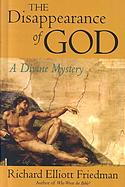
Now this is an interesting book. I'm not sure any summary could do it justice, so I'll just try to give you reasons to read it. In short, you could say that the book is about the literal disappearance of God over time in the Bible. I mean, who hasn't noticed that at the beginning of the book, you have Adam walking with God, and by the end he doesn't even talk to prophets any more. Despite the Christian viewpoint that Jesus Christ and the Father are both parts of the same whole, that doesnt' change the fact that viewed as his discrete part The Father, God gradually fades from view.
One element of the book is simply Friedman examining this narrative development in the Bible and simply pointing it out so that you can follow along. Another element is the examination of the reason behind this development. The third element is along the lines of what this disappearance means to people in the modern world.
Surely, if you have any aspirations to studying the Bible, Friedman's examination of the subject with regards to the story of the Bible is enough reason by itself. The man knows what he's talking about and you are guaranteed to learn a great deal that you did not know about the development of the Bible as a historical document. Friedman usally examines the Biblical subjects from the point of view of both the religious believer studying their sacred scripture and the non-religious student who wants to learn more about the development of the Judaic tradition.
As I said before, Friedman not only spends time examining the historical developments, but illustrating the reasons behind the developments, again, from two points of view. The gradual distancing of God from his people could be seen to have religious significance for the believer. It's a message about the state of humanity over time. For the non-religious reader, there's a story about priests and priest-kings doing what they had to do to keep a religion alive that supported the current power structure.
Both of these themes are intertwined in the beginning sections of the book. What kind of throws it off is when he starts talking about Nietzche and his book "Thus Spake Zarathustra". Nietzsche is generally famous for the few quotes people can remember of him, such as:
He who fights with monsters might take care lest he thereby become a monster. And if you gaze for long into an abyss, the abyss gazes also into you.
Friedrich Nietzsche, Beyond Good and Evil, Aphorism 146
What is good? All that heightens the feeling of power in man, the will to power, power itself. What is bad? All that is born of weakness. What is happiness? The feeling that power is growing, that resistance is overcome.
Friedrich Nietzsche, The Antichrist, section 2
God is dead.
Friedrich Nietzsche, The Gay Science, section 108
What does not kill me, makes me stronger.
Friedrich Nietzsche, Twilight of the Idols, 1888
Of course most people think Nietzsche was some anti-God, anti-morality, anti-love advocate. That's not the truth, and Friedman recognizes it. If anything, Nietzsche was one who would have rejoiced if he could have believed in a God. His writings often dealt with how to live in a world without a God in a way that didn't have us behaving like complete brutes.
Naturally, Nietzsche's thoughts are completely relevant to Friedman's theme of living without God in a modern world.
I can't say any more without getting into the problem of not saying enough to make it worth talking about, so I'm just going to have to leave it here. In my final opinion, this is a very good book, either in the field of religious studies or philosophy. It doesn't hurt that it's well-written and keeps your attention. Read it!
No comments:
Post a Comment